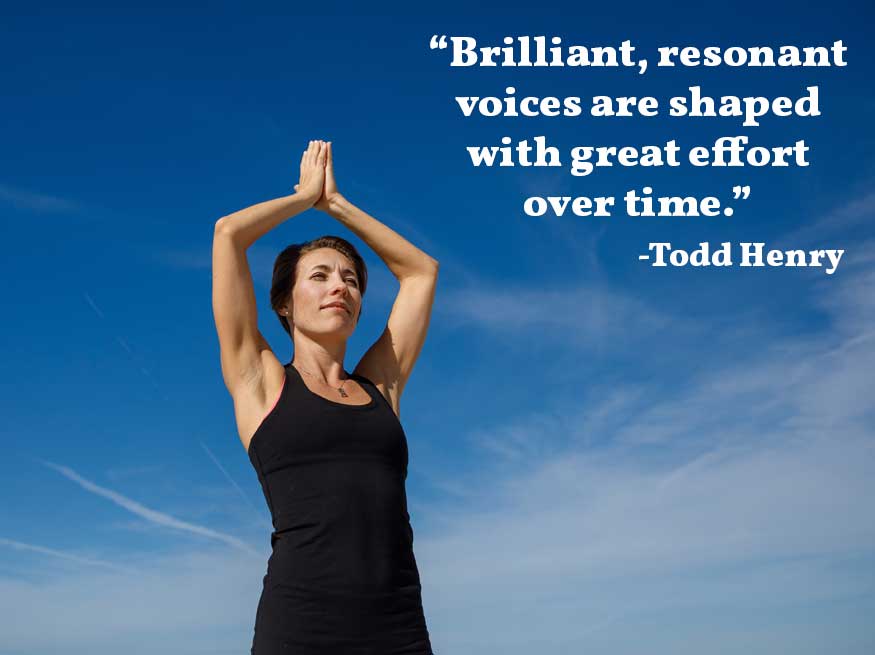 Your unique voice is the way in which you share your passions, skills, and experiences with the world. There are many ways to do this, in fact. When you speak passively or aggressively, it can alienate your message from being heard. But, when you insert these basic habits of assertive communicators into your interactions, you can resonate deeply with your students, clients, and fellow professionals.
Your unique voice is the way in which you share your passions, skills, and experiences with the world. There are many ways to do this, in fact. When you speak passively or aggressively, it can alienate your message from being heard. But, when you insert these basic habits of assertive communicators into your interactions, you can resonate deeply with your students, clients, and fellow professionals.
My authentic voice came quickly to the forefront on the second date with my now-husband, Steve. We were going to a movie, and since it was a new release, the theater was packed when we arrived. I spotted two seats in the front row of the rear section–you know, the ones that often have the convenient bar you can utilize as a footrest through most of the show?
Well, the problem was that these seats were separated by about ten people. So, I stood in front of the row, introduced myself, and requested that the entire group of ten people all move one seat to the left. That way, Steve and I could sit together and have some awesome seats for the film. With a little hesitation, they saw my vision and complied with my request.
Steve was in shock. He had no idea I would walk up to a group of strangers and be able to wield such influence. Well, you too have the capacity to speak your truth into words that can then take shape into actions and relationships that you desire. Sometimes it just takes a little practice to bring out that assertive communicator in you. We’ll show you how below.
HONOR YOUR VOICE
As a yoga professional, you spend a lot of time speaking. Whether it’s using your voice to lead a class or coordinate an upcoming workshop at your studio, how you speak influences the end result you experience. It also helps you carve your place in the yoga world and create lasting value for your community.
Your authentic voice comes not from who you should be, but who you are. I know for me (and I’m sure I can speak for most of you out there), I’m a work in progress. My relationship with the practice is evolving, and the way in which I teach my classes are, too.
In order to honor my voice, I weave my various experiences of yoga into something fresh and original. This keeps me inspired on my mat, and allows me to connect with others in a deeper way.
Said another way, you have a distinct past and one-of-a-kind perspective. Blend them in a way will allow you to have the positive impact you desire. Mastering some basic communication skills can only help you expand the reach of your unique voice.
When you express yourself via assertive communication, you:
- Demonstrate confidence
- Reveal certainty in who you are and where you are going
- Remain highly motivated
- Show clear intentions, and
- Get better results

Photo Credit: Casey Brooke Photography
DEVELOP YOUR ASSERTIVE COMMUNICATION SKILLS
There is a common myth out there that it takes 21 days to form a new habit. While it might be easy to acquire an easy skill in that time period, more complex and challenging ones can take longer. Research done at University College London actually found that it took an average of 66 days for a new habit to become automatic, and some activities took as long as 250 days. While the basic components of assertive communication might seem simple, interacting with others is actually quite complex. Why is this important?
Answer: Becoming skilled in assertive communication takes practice.
Take a look at the 6 habits of assertive communicators below. Practice using them in your conversations today. Notice how you utilize them when teaching yoga. Observe how they pop up in your physical and virtual business interactions. Maybe just pick one at a time and start there. Remember, keep it simple at first and watch your skill set build.
HABIT 1: STAY FOCUSED ON THE SUBJECT AT HAND
One positive byproduct of yoga is it increases your capacity to focus. You become acutely aware of the thoughts in your mind, how those thoughts turn to words, and those words to actions. While this does not mean you become infallible, or fail to speak out of anger or frustration, your focus does mean you can use direct, positive dialogue to enhance your conversations in a way that uplifts you and others.
In order to stay focused, you must first uncover the central message you wish to convey. This will vary from interaction to interaction. The theme you carry into an afternoon yoga class will differ from the information you want to share at a yoga staff meeting. No matter the context, have a clear picture of the words you want to use, where you want to lead others with your words, and what information you want to collect with your questions.
For example, I meet many new yoga instructors who are starting at ground zero to build a business. Often times, they fall into the common marketing trap of presenting all of the ways in which they could be of value to others. In sharing too much information, they dilute their message. One of our first tasks is to then highlight the one or two biggest ways in which they provide solutions for others.
Practice building focus into your dialogue by:
- Preparing for your classes or meetings ahead of time, so you have a clear idea of what you want to say.
- Noting your intention before going into each conversation. This could mean getting to your next meeting a few minutes early to collect your thoughts.
- Clarifying any outcome you want to achieve or experience in your interactions.

Photo Credit: Martin Sattler
HABIT 2: USE SHORT, DESCRIPTIVE SENTENCES
I love bullet points–they’re the epitome of effectiveness in communication. Bullet points let you convey your message in short, concise phrases. The goal of this habit is to transform your complex, intertwined thoughts into succinct sentences that can be easily absorbed by others. This skill comes in handy when short on time.
But, just because you are simplifying your ideas doesn’t mean you have to be dry and boring. In fact, quite the opposite is true. Using descriptive sentences and adding flair to your words can invite others into your world.
I often employ this tactic when subbing for another instructor at a studio. I’ll say:
- Hi, I’m Kym Coco, and I’m excited to be here today. (This covers who I am).
- For those of you who don’t know me, I’m trained in integral vinyasa yoga, which translates simply to moving the body intentionally with the breath. For the past decade, I’ve taught all ages and styles of yoga, including chair yoga for our beloved white-haired seniors and power flow classes for those young, strong college athletes. (This gives a brief history and builds credibility).
- Today, we are going to address lengthening of the spine as we explore various backbends that lead to dhanurasana. (this tells them where we are going).
- Please honor yourself by modifying as needed, and have fun in the process. (This reminds them class is a collaborative effort that is designed to be enjoyable).
You can speak in bullet points more often by:
- Outlining your intentions for a conversation in bullet points first.
- Creating a class introduction via the main points you want to cover.
- Formatting your emails in bullet point format, too. Just because you might not be face to face with someone does not mean the receiver won’t appreciate your directness on the other end.

HABIT 3: ACKNOWLEDGE THE OTHER PERSON
Aggressive communicators want to tell you their point of view without considering your perspective. Since you are cultivating the habits of an assertive communicator, however, it’s important to recognize the thoughts, feelings, and ideas of the person with whom you are speaking.
Essentially, this habit means that you consider your audience when crafting your dialogue. It also means that you validate their opinions and ideas by how you respond. Sometimes the words of others will indicate their point of view. Other times, their body language will reveal their stance. Assertive communication honors both you and them in the process.
Respond assertively to the experiences of others by using phrases such as these:
- “I know this pose can be challenging! See if you can soften your jaw, and maybe even smile, as you take two more deep breaths into your growing strength.”
- “Wow! I’ve never thought about teaching triangle pose like that before.”
- “I appreciate you reaching out to me with this offer. Let me have some time to think about it and I will get back to by the end of the week.”
- “Hmmm, I hear what you’re saying and I’m not sure I agree with it. Since we both respect each other, and I value your professional opinion, we might just have to agree to disagree on this one.”
- “Thank you.” Yep, say “thank you for coming to class,” “thank you for sharing your time and energy with me,” and “thank you for sharing your viewpoint.” These two words are incredibly powerful and can be even more so when you don’t insert your own perspective right after saying them.
HABIT 4: TAKE YOUR TIME
Life today is often fast-paced, and just because you specialize in the yoga field does not make you exempt from that fact. Well, unless you’ve decided to camp out in a cave for multiple months on end. But the busy-ness you experience each day can unwillingly creep into your communication with others. When that happens, we speak in haste, share only a portion of the intended message, or totally botch the message in such a way that it’s incomprehensible to the receiver.
There are many ways in which you can take your time as an assertive communicator. One, you can actually slow down your verbal pace. Many times this happens naturally when teaching a restorative or yin class (compared to a power flow). Two, change up your tonal inflections. When you are nervous or uncertain, you can speed up your speech and lose the fluctuations in your voice that reflect the meaning of your words. Three, you can focus on the body language of those around you. Remember, words are just a glimpse of how your message is being received. Observe what is being communicated beyond your dialogue.
You practice taking your time as a communicator when you:
- Schedule in some time to clear your head before a meeting or class.
- Take a deep breath before you speak.
- Invite your students to focus on the exhale during the practice. This could extend beyond a 3 count inhale and 5 count exhale does in a seated position to a conscious outbreath in more dynamic and static standing poses, too.

HABIT 5: SAY WHAT YOU MEAN & MEAN WHAT YOU SAY
As the habits of assertive communicators begin to take root, integrity can infuse your dialogue. Said another way, your mouth and your gut respond in the same way in a conversation. You know what I mean here. How many times have you said “yes” with your mouth even though every cell of your body was screaming “NO”?
We guide our students to find this honesty in their yoga practice. When you notice the hips are tight, you don’t force yourself or them into padmasana, right? The same principle applies to your communication.
Create harmony with your mind, body, and words by:
- Being honest with yourself first. Continually reflect on who you are and what you want. This will add clarity to your speech, and enhance your ability to make decisions that support your priorities.
- Speaking your true feelings with those you trust first. People who love you, and want the best for you, will make the practice of speaking up for your own needs much easier. When you practice this over and over again, you will have the habit established of being honest (even when fear of rejection or rebuke might arise in more difficult relationships).
- Saying no more often. By simply declining certain events or engagements, you make the space for even greater experiences to flourish.

Photo Credit: Casey Brooke Photography
HABIT 6: ASK QUESTIONS
Many great leaders have mastered the habit of asking questions. This not only reinforces Habit 3 (that you acknowledge the experience of others), but it keeps you in control of the interaction. The questions you ask bring clarity to the conversation. It also helps keep you on track to collect the information you desire and it moves you toward a resolution.
You might ask a new student before class if they have any injuries. Perhaps you address the entire group and ask if anyone has any special requests for the practice ahead. I definitely have a questionnaire that goes out to new clients before our first session so I have a better understanding of our starting point together.
One easy way to build your skills as an assertive communicator this week:
- Ask lots of questions. You’ll be surprised at how much harmony can be generated with others when you approach them with curiosity. Then, notice what you learn as a result of keeping your mouth shut and your ears open.
PUTTING IT TOGETHER
Honoring your voice is a skill, and practicing these six habits of assertive communicators will help you share your message with more clarity, poise, and ease. You will also gain rapport, or harmony, with your students and business counterparts. They will know where you stand, and less likely be afraid to speak truthfully because they know you do the same.
Just remember, it’s your commitment to becoming an assertive communicator that matters most. It’s really the small habits that you cultivate now–day in and day out–that can reveal bigger successes in the long run.








Leave A Comment